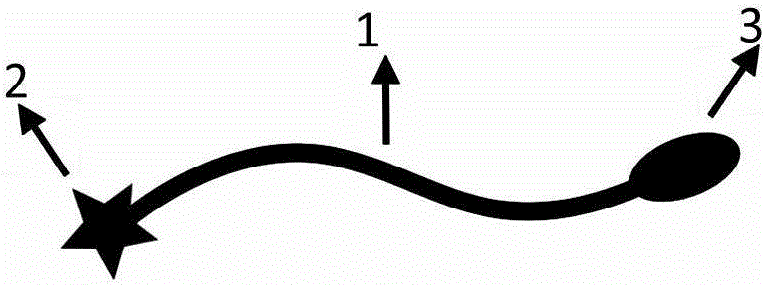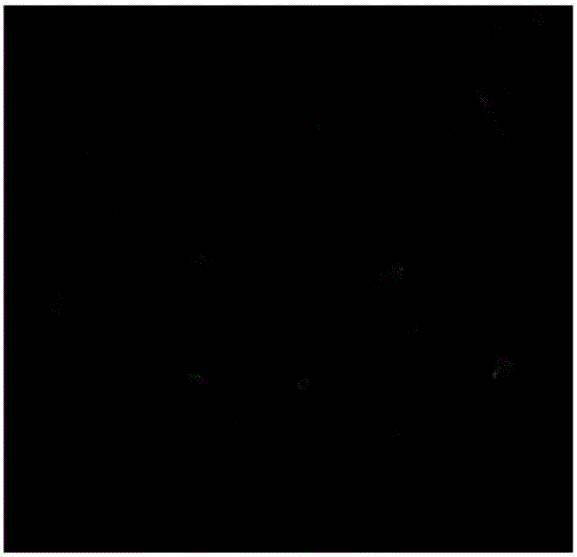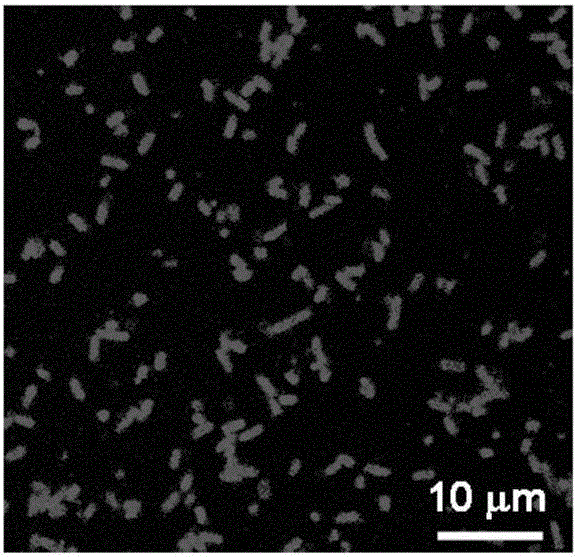Fluorescent dyeing reagent for detecting bacterium and fungus survival state and its preparation method and use
A fluorescent dyeing and reagent technology, applied in the field of microbial detection, can solve the problems of macrobiotic toxicity, poor water solubility, human and ecological environment hazards, etc., and achieve the effects of safe components, low toxicity, and good water solubility.
- Summary
- Abstract
- Description
- Claims
- Application Information
AI Technical Summary
Problems solved by technology
Method used
Image
Examples
Embodiment 1
[0027] (1) First, protoporphyrin (PpIX), 1-(3-dimethylaminopropyl)-3-ethylcarbodiimide hydrochloride (EDC·HCl) and N-hydroxysuccinimide (NHS ) is activated as a raw material to the carboxyl group of the protoporphyrin molecule. Weigh 10 mg PpIX, 20.4 mg EDC·HCl and 12.3 mg NHS and dissolve them in 1 mL dimethyl sulfoxide (DMSO). PpIX is first mixed with EDC·HCl and then NHS is added to react at room temperature for 2 hours to fully activate the carboxyl group.
[0028] (2) Weigh 4.2 mg of cholesterol-PEG2000-amino (cholesterol-PEG2000-NH 2 ) and 43 μL triethylamine were co-dissolved in DMSO and mixed with the above reaction system. After overnight reaction at room temperature, purification was performed by dialysis against DMSO for 2 days using a dialysis bag with a molecular weight cut-off of 2k, followed by dialysis in ultrapure water for 1 day. Finally, it was freeze-dried in a lyophilizer to produce cholesterol-PEG2000-PpIX, and stored at -20°C.
[0029] The reagent obt...
Embodiment 201
[0031] In Example 201, the molecular weight of polyethylene glycol is 1000, and the fluorescent molecules protoporphyrin (PpIX), 1-(3-dimethylaminopropyl)-3-ethylcarbodiimide hydrochloride (EDC·HCl ) and N-hydroxysuccinimide (NHS) in a molar ratio of 1:4:48; the reaction time at room temperature is 3 hours; the molar ratio of fluorescent molecules to cholesterol-polyethylene glycol-amino molecules is 2:1. The MWCO of the dialysis bag is 1000.
Embodiment 202
[0032] In Example 202, the molecular weight of polyethylene glycol is 5000, and the fluorescent molecules protoporphyrin (PpIX), 1-(3-dimethylaminopropyl)-3-ethylcarbodiimide hydrochloride (EDC·HCl ) and N-hydroxysuccinimide (NHS) in a molar ratio of 1:10:20; the reaction time at room temperature is 2 hours; the molar ratio of fluorescent molecules to cholesterol-polyethylene glycol-amino molecules is 10:1. The MWCO of the dialysis bag is 1000.
PUM
 Login to View More
Login to View More Abstract
Description
Claims
Application Information
 Login to View More
Login to View More - R&D
- Intellectual Property
- Life Sciences
- Materials
- Tech Scout
- Unparalleled Data Quality
- Higher Quality Content
- 60% Fewer Hallucinations
Browse by: Latest US Patents, China's latest patents, Technical Efficacy Thesaurus, Application Domain, Technology Topic, Popular Technical Reports.
© 2025 PatSnap. All rights reserved.Legal|Privacy policy|Modern Slavery Act Transparency Statement|Sitemap|About US| Contact US: help@patsnap.com



